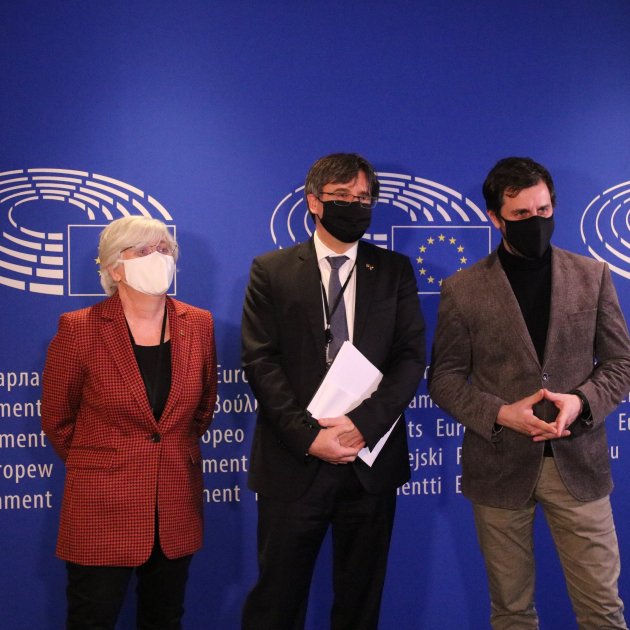The three Catalan pro-independence MEPs who were elected by Spanish and Catalan voters in 2019 even though they were wanted by the Spanish authorities, Carles Puigdemont, Toni Comín and Clara Ponsatí, faced the European Parliament's Legal Affairs Committee this afternoon to defend their immunity from prosecution as MEPs. The Spanish Supreme Court is requesting that this immunity be waived in order to begin an extradition hearing against the three, accused of sedition over the 2017 Catalan referendum issue, and the European Parliament is to decide on whether or not to grant the Spanish court's request.
Fomer Catalan president Puigdemont was the first to speak, in a 45-minute appearance in which he set out his arguments and answered MEPs' questions.
In a statement prior to his appearance, he expressed confidence about overcoming this obstacle, just as the three exiled JxCat party representatives succeeded, after six months, in overcoming the difficulties of taking their seats. "We will fight. Just as they said we would not be MEPs, they were wrong. We are in the same situation," he said.
However, the Catalan politician avoided commenting on statements made today by the chairman of the Legal Affairs Committee, Adrián Vázquez (Spanish MEP for the Ciudadanos party), who asserted that the recent ruling of the Brussels Court of Appeal rejecting Spain's European Arrest Warrant against another exiled Catalan politician, Lluís Puig, has no relevance on the decision by the European chamber.
Puigdemont responded by pointing out that the committee's debates are confidential. "I do respect the confidentiality of a committee chaired by this person even if I don't know if he respects it equally," he asserted, adding, "I won't talk now about what I plan to talk about inside."
After Puigdemont, Comín was to appear before the committee, and finally, Ponsatí, all three accompanied by their lawyer Gonzalo Boye.
The appearance of the three Catalan MEPs was preceded last week by the decision of the Brussels Court of Appeals which rejected the European Arrest Warrant against their former colleague in the pro-independence Catalan government, Lluís Puig, accepting many of the arguments that the MEPs are using against the Spanish authorities' request. For example, the Belgian judiciary accepted that the Spanish Supreme Court was not competent to try the case, and that Spain had violated the right to presumption of innocence, as a result of the public positioning by senior Spanish government figures assuming the guilt of the pro-independence leaders.
After today's appearances, the MEP acting as rapporteur, who presents the Spanish's court requests, will have to prepare a report to be presented to the committee, which, at a fourth meeting on the matter, will be put to a vote on whether to accept it or not. In fact, a single rapporteur, Bulgarian ultra-conservative MEP Angel Dzhambazki, has been appointed for all three cases, a matter which goes against the regulations and about which the Catalan politicians have made a complaint.
The decision will finally be sent to the plenary of the European Parliament to be voted on.
In the main image, Clara Ponsatí, Carles Puigdemont and Toni Comín, today ahead of their appearance before the Legal Affairs Committee of the European Parliament.
